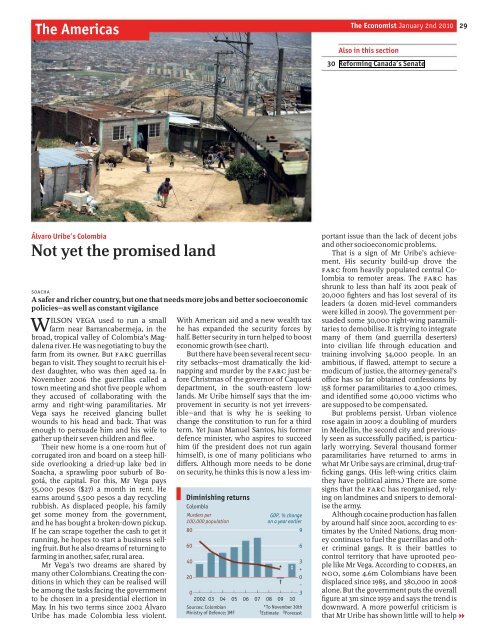Economics focus - the ultimate blog
Economics focus - the ultimate blog
Economics focus - the ultimate blog
Create successful ePaper yourself
Turn your PDF publications into a flip-book with our unique Google optimized e-Paper software.
The Americas<br />
Álvaro Uribe’s Colombia<br />
Not yet <strong>the</strong> promised land<br />
Soacha<br />
A safer and richer country, but one that needs more jobs and better socioeconomic<br />
policiesas well as constant vigilance<br />
WILSON VEGA used to run a small<br />
farm near Barrancabermeja, in <strong>the</strong><br />
broad, tropical valley of Colombia’s Magdalena<br />
river. He was negotiating to buy <strong>the</strong><br />
farm from its owner. But FARC guerrillas<br />
began to visit. They sought to recruit his eldest<br />
daughter, who was <strong>the</strong>n aged 14. In<br />
November 2006 <strong>the</strong> guerrillas called a<br />
town meeting and shot ve people whom<br />
<strong>the</strong>y accused of collaborating with <strong>the</strong><br />
army and right-wing paramilitaries. Mr<br />
Vega says he received glancing bullet<br />
wounds to his head and back. That was<br />
enough to persuade him and his wife to<br />
ga<strong>the</strong>r up <strong>the</strong>ir seven children and ee.<br />
Their new home is a one-room hut of<br />
corrugated iron and board on a steep hillside<br />
overlooking a dried-up lake bed in<br />
Soacha, a sprawling poor suburb of Bogotá,<br />
<strong>the</strong> capital. For this, Mr Vega pays<br />
55,000 pesos ($27) a month in rent. He<br />
earns around 5,500 pesos a day recycling<br />
rubbish. As displaced people, his family<br />
get some money from <strong>the</strong> government,<br />
and he has bought a broken-down pickup.<br />
If he can scrape toge<strong>the</strong>r <strong>the</strong> cash to get it<br />
running, he hopes to start a business selling<br />
fruit. But he also dreams of returning to<br />
farming in ano<strong>the</strong>r, safer, rural area.<br />
Mr Vega’s two dreams are shared by<br />
many o<strong>the</strong>r Colombians. Creating <strong>the</strong> conditions<br />
in which <strong>the</strong>y can be realised will<br />
be among <strong>the</strong> tasks facing <strong>the</strong> government<br />
to be chosen in a presidential election in<br />
May. In his two terms since 2002 Álvaro<br />
Uribe has made Colombia less violent.<br />
With American aid and a new wealth tax<br />
he has expanded <strong>the</strong> security forces by<br />
half. Better security in turn helped to boost<br />
economic growth (see chart).<br />
But <strong>the</strong>re have been several recent security<br />
setbacksmost dramatically <strong>the</strong> kidnapping<br />
and murder by <strong>the</strong> FARC just before<br />
Christmas of <strong>the</strong> governor of Caquetá<br />
department, in <strong>the</strong> south-eastern lowlands.<br />
Mr Uribe himself says that <strong>the</strong> improvement<br />
in security is not yet irreversibleand<br />
that is why he is seeking to<br />
change <strong>the</strong> constitution to run for a third<br />
term. Yet Juan Manuel Santos, his former<br />
defence minister, who aspires to succeed<br />
him (if <strong>the</strong> president does not run again<br />
himself), is one of many politicians who<br />
diers. Although more needs to be done<br />
on security, he thinks this is now a less im-<br />
Diminishing returns<br />
Colombia<br />
Murders per<br />
100,000 population<br />
80<br />
60<br />
40<br />
3<br />
* ‡ +<br />
20<br />
†<br />
0<br />
–<br />
0<br />
3<br />
2002 03 04 05 06 07 08 09 10<br />
Sources: Colombian<br />
Ministry of Defence; IMF<br />
GDP, % change<br />
on a year earlier<br />
9<br />
6<br />
*To November 30th<br />
† Estimate ‡ Forecast<br />
The Economist January 2nd 2010 29<br />
Also in this section<br />
30 Reforming Canada’s Senate<br />
portant issue than <strong>the</strong> lack of decent jobs<br />
and o<strong>the</strong>r socioeconomic problems.<br />
That is a sign of Mr Uribe’s achievement.<br />
His security build-up drove <strong>the</strong><br />
FARC from heavily populated central Colombia<br />
to remoter areas. The FARC has<br />
shrunk to less than half its 2001 peak of<br />
20,000 ghters and has lost several of its<br />
leaders (a dozen mid-level commanders<br />
were killed in 2009). The government persuaded<br />
some 30,000 right-wing paramilitaries<br />
to demobilise. It is trying to integrate<br />
many of <strong>the</strong>m (and guerrilla deserters)<br />
into civilian life through education and<br />
training involving 34,000 people. In an<br />
ambitious, if awed, attempt to secure a<br />
modicum of justice, <strong>the</strong> attorney-general’s<br />
oce has so far obtained confessions by<br />
158 former paramilitaries to 4,300 crimes,<br />
and identied some 40,000 victims who<br />
are supposed to be compensated.<br />
But problems persist. Urban violence<br />
rose again in 2009: a doubling of murders<br />
in Medellín, <strong>the</strong> second city and previously<br />
seen as successfully pacied, is particularly<br />
worrying. Several thousand former<br />
paramilitaries have returned to arms in<br />
what Mr Uribe says are criminal, drug-traf-<br />
cking gangs. (His left-wing critics claim<br />
<strong>the</strong>y have political aims.) There are some<br />
signs that <strong>the</strong> FARC has reorganised, relying<br />
on landmines and snipers to demoralise<br />
<strong>the</strong> army.<br />
Although cocaine production has fallen<br />
by around half since 2001, according to estimates<br />
by <strong>the</strong> United Nations, drug money<br />
continues to fuel <strong>the</strong> guerrillas and o<strong>the</strong>r<br />
criminal gangs. It is <strong>the</strong>ir battles to<br />
control territory that have uprooted people<br />
like Mr Vega. According to CODHES, an<br />
NGO, some 4.6m Colombians have been<br />
displaced since 1985, and 380,000 in 2008<br />
alone. But <strong>the</strong> government puts <strong>the</strong> overall<br />
gure at 3m since 1959 and says <strong>the</strong> trend is<br />
downward. A more powerful criticism is<br />
that Mr Uribe has shown little will to help 1








![[ccebbook.cn]The Economist August 1st 2009 - the ultimate blog](https://img.yumpu.com/28183607/1/190x252/ccebbookcnthe-economist-august-1st-2009-the-ultimate-blog.jpg?quality=85)



![[ccebook.cn]The World in 2010](https://img.yumpu.com/12057568/1/190x249/ccebookcnthe-world-in-2010.jpg?quality=85)
![[ccemagz.com]The Economist October 24th 2009 - the ultimate blog](https://img.yumpu.com/5191885/1/190x252/ccemagzcomthe-economist-october-24th-2009-the-ultimate-blog.jpg?quality=85)